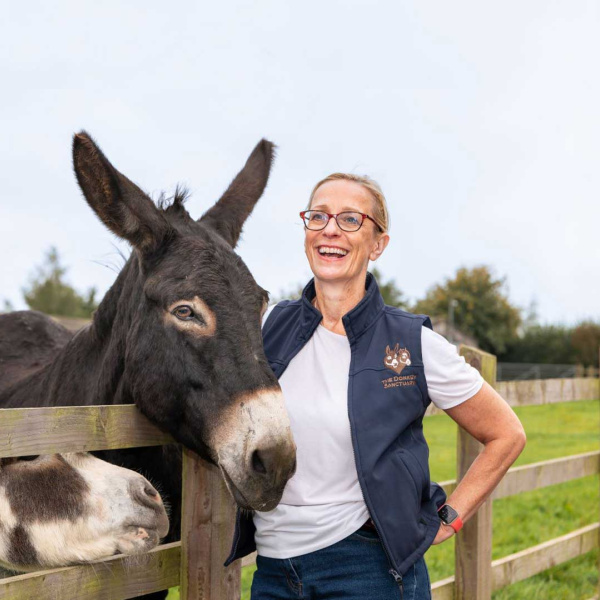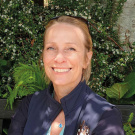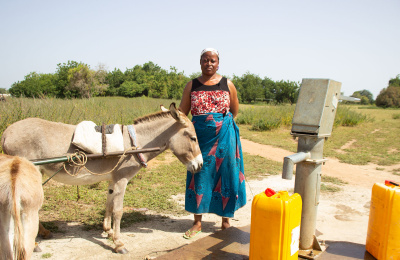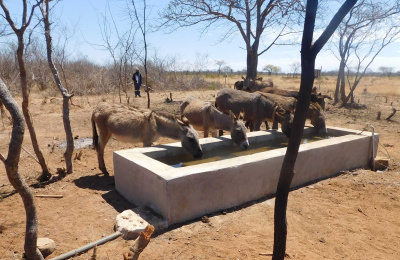World Animal Day is an opportunity to recognise the incredible ways animals, great and small, enhance and enrich our lives. Our CEO, Marianne Steele, explains the special donkey-human connection.
The relationship between donkeys and humans stretches back over millennia. Together we have built civilisations and together we have seen them fall. Side-by-side, donkeys and humans have fetched water, tilled fields and endured war, famine and drought. When natural disasters occur, donkeys guide us through treacherous conditions, providing relief in hostile environments. We are co-workers, partners, companions.
The emotional connection between humans and dogs is widely recognised and researched. Their ability to relate means that even in service, they are appreciated beyond their value as a working animal. Around the world, donkeys fulfil a similar role, somewhere between service and companionship. It is a relationship born of utility, but it is their character and essence that make it much more than that.
As an international donkey welfare charity, we are interested in this relationship from the donkey’s perspective, and how the bond we share can influence their welfare and status in the world. Understanding this is at the heart of some of our recent research.
Donkeys are curious, intelligent and sensitive creatures. Their limbic system is similar to our own, giving them capacity to feel a wide range of emotions, just as we do. It is this sense of empathy and loyalty that makes them such valued and trusted companions.
A research-based approach
This summer, research we helped to fund into the bond between humans and donkeys was published in the Journal of Applied Animal Welfare Science. The findings showed that across countries and cultures, equids whose owners believed in their capacity to feel emotion were in significantly better health than those whose owners did not. Similarly, in previous research, we found that the donkeys working in India’s brick kilns whose owners used compassionate language toward them had slightly better welfare. In other words, the stronger the emotional bond between donkey and human, the better the welfare of that animal.
This research adds scientific weight to what we have been saying for over 50 years – that donkeys are sensitive and intelligent individuals who deserve our kindness and respect.
However, the authors caution against making assumptions about owners who did not report an emotional connection and whose animals were in poorer health. The research did not explore if they held back from acknowledging their donkeys’ feelings – not because they are unkind, but because they simply do not have the resources to provide better welfare.
Donkeys and livelihoods
Our mission is to improve the lives of donkeys and mules, every day. The work we do with Action Aid in Ghana and Women and Land Zimbabwe, is driven by the symbiotic principle that if we give people the tools and resources to improve the welfare of their donkeys – which is our priority – their donkeys will be healthier, live longer and be better able to support their community. This highlights the interconnection between animal welfare and human wellbeing – what is good for donkeys is good for humans too.
A second peer-reviewed paper published in the journal Society & Animals, explores this connection within communities in central Ethiopia. Here both women and donkeys are marginalised, their work undervalued, and ownership of a donkey can be the difference between modest survival and destitution. However, the bond between these women and their donkeys is much more than utility – one woman described her donkey as ‘a member of my family’, and another as ‘my friend’. Supporting these women through education and welfare interventions will not only improve the lives of both women and donkeys, but it can also elevate their status by highlighting the value they bring to their communities and wider society.
Research and experience give us confidence that our focus on a single species, the donkey, can effect wider, positive change for their communities and the places they inhabit. ‘One Welfare’ is the concept that animal welfare depends on and influences human welfare and environmental sustainability. Through our relationship with donkeys, we can provide uniquely valuable insights to aid understanding of the concepts behind One Welfare and inform development of its practical applications, an example of this is seen in our research published earlier this year. In a wider context, our work with donkeys could help shape policy and interventions that bring us that bit closer to achieving global sustainable development goals.
The benefits of rehabilitation
Closer to home, at our centres and sanctuaries here in Great Britain, we see the benefits of this emotional connection in the donkeys who come to us through rescue or relinquishment. Through our Donkey Assisted Activities (DAA), we bring people and donkeys together, giving them space to connect on an emotional and physical level. Like the donkeys we rescue, many people in our programmes have experienced trauma or poor health, and it is incredibly moving to hear their accounts of the lasting impact that spending time with these remarkable animals has had on their wellbeing.
The benefits to humans of animal-assisted activities (AAA) are widely accepted, but our DAA work is first and foremost part of the rehabilitation journey for our donkeys. Research we published last year was novel in that it considered the interventions from an animal-centred approach. By taking the donkey’s perspective in our research and our practice, we are building an evidence base that demonstrates the value to both human and animal participants of placing animal experience at the centre of such programmes.
Looking forward
Our vision is of a world where every donkey and mule has a good quality of life. We have a long way to go, but recognising their value – not in terms of utility and what they can do for us, but their intrinsic value as sensitive and sentient beings – is fundamental to this.
As our growing body of research suggests, if we make the world a better place for donkeys, we make it a better place for their human companions too.



